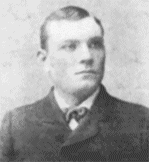![]() aka: The Magic City - Porkopolis - South"O" Douglas County, Nebraska
aka: The Magic City - Porkopolis - South"O" Douglas County, Nebraska
MAYORS OF SOUTH OMAHA
From October 1886, when South Omaha was incorporated as a town, until June 1915, when it became part of Omaha, eleven mayors held office:
1887 - 1888 - Ezra P. Savage (Rep.)
1888 - 1892 - W. G. Sloane (Dem.)
1892 - 1893 - C. P. Miller (Rep.) Died in Office
1893 - 1893 - John S. Walters (Dem.) Acting
1893 - 1894 - O. E. Walker (Rep.)
1894 - 1896 - Ed Johnson (Dem.)
1896 - 1900 - Thomas H. Ensor (Dem.)
1900 - 1902 - A. R. Kelley (Rep.)
1902 - 1906 - Frank Koutsky (Rep.)
1906 - 1908 - Thomas Hoctor (Dem.)
1908 - 1910 - Frank Koutsky (Rep.)
1910 - 1912 - Patrick J. Trainor (Rep.)
1912 - 1915 - Thomas Hoctor (Dem.)
MAYOR THOMAS HOCTOR
 Thomas Hoctor
Thomas Hoctor
After surviving an Irish potatoe famine, the Civil War battlefield and an Indian uprising, Patrick Hoctor moved to Nebraska with his wife Julia in 1875 and settled on a farm six miles south of Omaha. One of the first dozen settlers in the area, Patrick Hoctor purchased the former Dennis Dee house at 2701 (later changed to 2702) Harrison Street.
Strict Catholics, the Hoctors walked to St. Patrick's Church at 10th and Castelar Streets in order to give the horses a day of rest on Sunday. They were among the first members of St. Agnes Church at 23rd and Q Streets when it was founded in 1885.
Patrick and Julia had several children, including Thomas, who had been born in a log cabin in Minnesota before they had moved to Nebraska. Thomas Hoctor attended a one-room country school and later enrolled in a business school in Omaha, but continued to help his father on the farm. Like many second-generation Irishmen, Thomas gravitated toward politics. He was elected city clerk of South Omaha before he was 21 years old. He was later elected city treasurer, county commissioner and in 1906 Mayor of South Omaha. He was again elected Mayor in 1912. Thomas was referred to in the Omaha press as "the man with a heart as big as a sugar barrel", often cutting through red tape to get coal and groceries delivered to needy families.
For years he fought South Omaha's annexation bitterly, but finally lost to the forces favoring merger with Omaha, thus marking the end of an era. After that, Hoctor spent more time at his real estate office. His German-born wife, Pauline, had become a Catholic to learn English. She moved to the United States and married Hoctor in 1890.
In 1927, Thomas Hoctor died while aboard a train returning from La Platte. For years he
had suffered from a duodenal ulcer that suddenly perforated while on a visit to the farm
of his son, Charles Hoctor. With no hospital nearby, he was put on the train in
hopes it would get him to Omaha in time. Unfortunately, it did not. Funeral services were
conducted at St. Bridget's Church with over 700 people attending.
MAYOR W. G. SLOANE
W. G. Sloane was born in Franklin county, Vermont. When about twenty years of age, he spent a year seeing the sights of Colorado and New Mexico. He then returned to Vermont and engaged in the drug business for over three years and then came to Omaha, where he was connected with prominent drug houses as a traveling salesman. On June 23, 1884, he came to South Omaha and with D. W. Saxe, started the first drug store in this city where they also carried a stock of groceries.
In October of the same year he was appointed postmaster of South Omaha, which office he
held for about three and a half years. He also served as one of the village trustees and
was twice elected mayor of the city. In 1888 he was a candidate for presidential
elector-at-large on the state democratic ticket. In 1887, Mr. Sloane retired from the firm
of Sloane & Saxe and began his interest in the real estate business with E. H. Dowd
and also the furniture buisness as a member of the firm of Brewer, Sloane & Co.
| Douglas Co. NEGenWeb | Back to South Omaha Index |